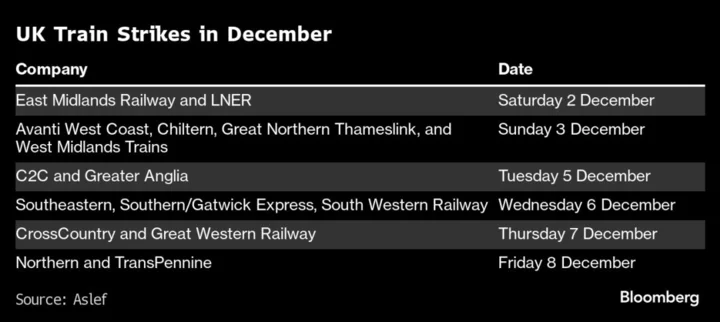Britain’s pubs and restaurants are hoping customers brush off the latest round of rail strikes, after festive sales were devastated by industrial action during last year’s holiday period.
Train drivers from the Aslef union began nine days of protest on Friday, starting with an overtime ban. Strikes begin on Saturday but are spread out, with each affected rail line targeted on only one of six days. It marks a slowdown from a year ago when thousands of rail workers walked out across the whole of the UK on multiple days in the run up to Christmas.
The labor group at the heart of last year’s disruption, the RMT, accepted a pay deal Thursday that will end its own strikes until at least the spring. Aslef is now the last major rail union holding out for a bigger raise.
“This year we haven’t had so much impact yet, fingers crossed,” said Soren Jessen, owner of 1 Lombard Street, a restaurant in the City of London. “This week might be our busiest so far this year, and next week is equally busy. So we’re just waiting, holding our breath for Monday.” He said the restaurant, which sits opposite the Bank of England, lost £100,000 ($126,500) from cancellations during last year’s pre-Christmas strikes.
Overall, pubs, bars and restaurants lost £3.5 billion in sales from a year of rail strikes, according to the UKHospitality industry group.
Read More: UK Rail Union Votes to End Strikes, But Others Still Rumble On
Ministers are still insisting that train drivers, who are mainly represented by Aslef, have been offered a basic salary close to £65,000 for a four-day week. The union says that deal was rejected months ago and accuses the government of failing to engage in new talks. Its boss Mick Whelan said this week that industrial action would continue until negotiations resume.
“This current round of train strikes doesn’t include all services at once, so has had significantly less impact than previous years,” said Gemma Keegan, brand director at Swingers, a crazy golf company. However, businesses particularly exposed to rail strikes are still expecting a hit. Phil Pinder owns Potions Cauldron, a soft drinks maker with five venues across the UK — including one in a train station kiosk in York.
Pinder said his branch in the station was trading down 20% on the year, whereas sales at his other venues have grown or stayed level.
“The lack of commuters coming back after Covid, the lack of investment by the government in the railways and the train strikes on top of that just make it really difficult,” Pinder said. “We are now going to still steer clear of train stations, it’s a nightmare.”









